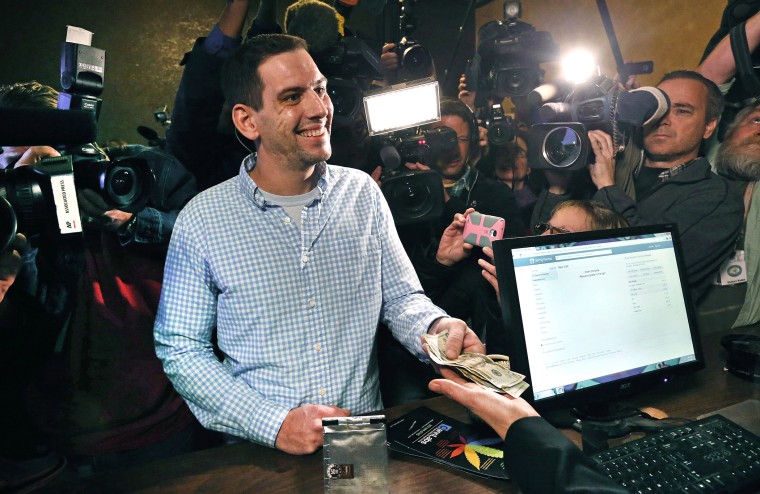Coloradans can now get high on more than just the ski slopes.
Residents bid farewell to 2013 and greeted the new year as Colorado became the country's first state to sell recreational marijuana legally beginning on this week's so-called "Green Wednesday." Marijuana use is still considered a crime under federal law.
"I think most of those folks were doing it to make a point, to make a statement. Ordinarily I don’t think people are buying their marijuana at 8 a.m. on New Year's Day," Aaron Smith, co-founder and executive director of the National Cannabis Industry Association, told msnbc.
Leaders of Amendment 64, the 2012 initiative that made the drug legal, designated Cpl. Sean Azzariti as the state's "first" buyer of legal recreational marijuana from a license, tax-paying business. A Denver-based Iraq war veteran with post-traumatic stress disorder, Azzariti could not receive legal access to medical marijuana in his home state prior to Wednesday.
"Marijuana helped me from the moment I started using it," Azzariti, who deployed twice to Iraq, said during a 2012 television advertisement urging residents to vote "Yes on 64." "It calmed me down, it slowed my heart rate down. My anxiety was almost gone immediately."
He tweeted his excitement after his now-famous purchase from Denver's 3D Cannabis Center:
The center, a business that allows visitors to see its cannabis-viewing room, in a telephone voice recording urged customers on Thursday to return Friday at 10 a.m. Central Standard Time because of long purchasing lines.
More than 100 businesses applied for state and local licenses required for the recreational sale of the drug, but only about three dozen companies throughout the western state could participate on the first day, said Mason Tvert, director of communications for the Marijuana Policy Project. The state issued more than 300 licenses to retail stores, product manufacturers, and cultivation and testing facilities. But most of the companies need to wait for local approval, which has been delayed due to a late start in the public hearing process.
Amendment 64, which Coloradans passed in November 2012, removes all legal penalties for personal possession of up to 1 oz. and the home-growing of no more than six plants; makes the personal use, possession, and limited home-growing of marijuana legal for adults 21 and older; taxes the substance similarly to alcohol; and allows for the cultivation, processing, and sale of industrial hemp.
Leaders estimate tax revenue to reach $70 million a year from the sales, of which a portion will fund public school construction programs, Tvert said. Additionally, law enforcement officials can focus on other crimes instead of prosecuting adults for using marijuana. Officials hope the legalization will further reduce teenage marijuana use, which declined by 11% in the most recent data between 2009 and 2011.
Tvert, who is also co-director of the Amendment 64 campaign, began drafting the initiative in January 2011 with other individuals.
A majority of Americans--58%--agreed with Coloradans about marijuana for the first time in October 2013, according to a Gallup Poll. When the organization first asked the public the same question in 1969, a mere 12% favored legalization.
Smith works as part of the National Cannabis Industry Association to urge Congress to defer to individual states to create their own marijuana policies. In celebration of the group's triumph, he bought a gram of marijuana on Wednesday and plans to frame it to remember the historic day.
"It felt symbolic to me," he said, "to be able to walk into a store as an adult and purchase a substance that is far safer than alcohol, and support a local business."
